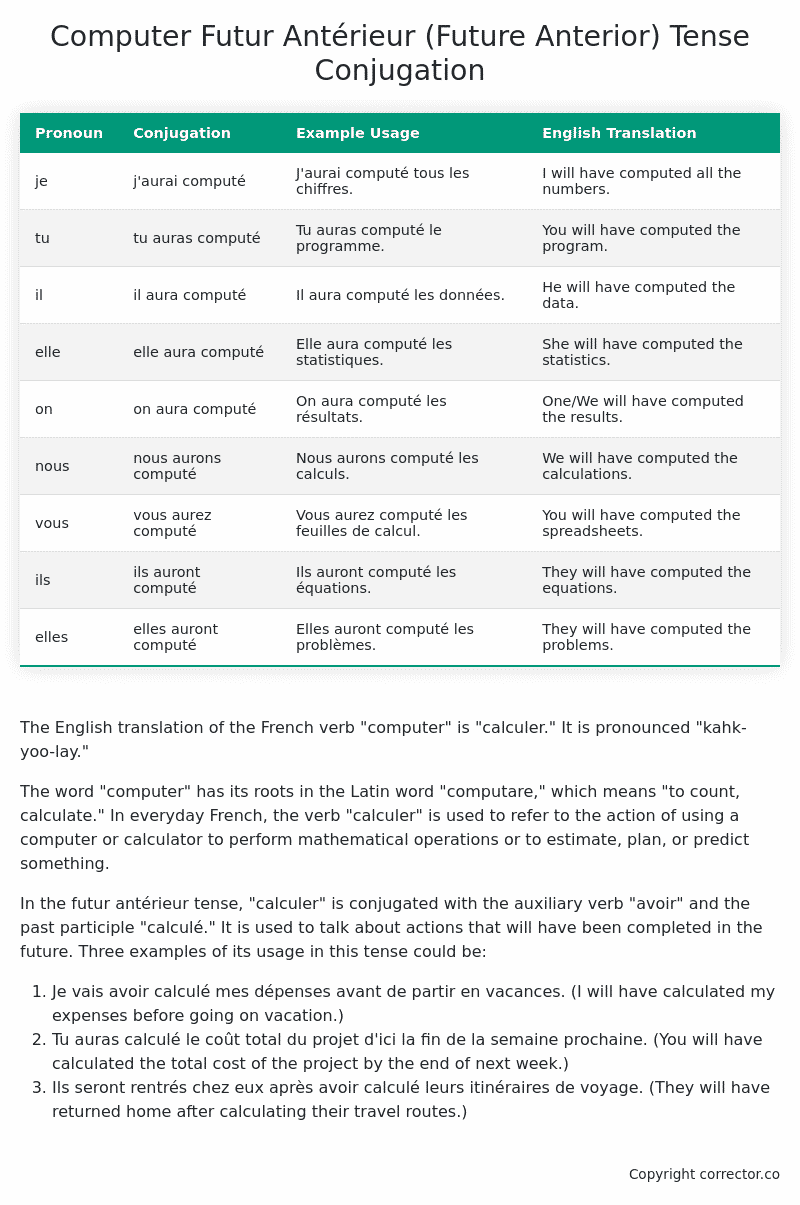Futur Antérieur (Future Anterior) Tense Conjugation of the French Verb computer
Introduction to the verb computer
The English translation of the French verb “computer” is “calculer.” It is pronounced “kahk-yoo-lay.”
The word “computer” has its roots in the Latin word “computare,” which means “to count, calculate.” In everyday French, the verb “calculer” is used to refer to the action of using a computer or calculator to perform mathematical operations or to estimate, plan, or predict something.
In the futur antérieur tense, “calculer” is conjugated with the auxiliary verb “avoir” and the past participle “calculé.” It is used to talk about actions that will have been completed in the future. Three examples of its usage in this tense could be:
- Je vais avoir calculé mes dépenses avant de partir en vacances. (I will have calculated my expenses before going on vacation.)
- Tu auras calculé le coût total du projet d’ici la fin de la semaine prochaine. (You will have calculated the total cost of the project by the end of next week.)
- Ils seront rentrés chez eux après avoir calculé leurs itinéraires de voyage. (They will have returned home after calculating their travel routes.)
Table of the Futur Antérieur (Future Anterior) Tense Conjugation of computer
| Pronoun | Conjugation | Example Usage | English Translation |
|---|---|---|---|
| je | j’aurai computé | J’aurai computé tous les chiffres. | I will have computed all the numbers. |
| tu | tu auras computé | Tu auras computé le programme. | You will have computed the program. |
| il | il aura computé | Il aura computé les données. | He will have computed the data. |
| elle | elle aura computé | Elle aura computé les statistiques. | She will have computed the statistics. |
| on | on aura computé | On aura computé les résultats. | One/We will have computed the results. |
| nous | nous aurons computé | Nous aurons computé les calculs. | We will have computed the calculations. |
| vous | vous aurez computé | Vous aurez computé les feuilles de calcul. | You will have computed the spreadsheets. |
| ils | ils auront computé | Ils auront computé les équations. | They will have computed the equations. |
| elles | elles auront computé | Elles auront computé les problèmes. | They will have computed the problems. |
Other Conjugations for Computer.
Le Present (Present Tense) Conjugation of the French Verb computer
Imparfait (Imperfect) Tense Conjugation of the French Verb computer
Passé Simple (Simple Past) Tense Conjugation of the French Verb computer
Passé Composé (Present Perfect) Tense Conjugation of the French Verb computer
Futur Simple (Simple Future) Tense Conjugation of the French Verb computer
Futur Proche (Near Future) Tense Conjugation of the French Verb computer
Plus-que-parfait (Pluperfect) Tense Conjugation of the French Verb computer
Passé Antérieur (Past Anterior) Tense Conjugation of the French Verb computer
Futur Antérieur (Future Anterior) Tense Conjugation of the French Verb computer (this article)
Subjonctif Présent (Subjunctive Present) Tense Conjugation of the French Verb computer
Subjonctif Passé (Subjunctive Past) Tense Conjugation of the French Verb computer
Subjonctif Imparfait (Subjunctive Imperfect) Tense Conjugation of the French Verb computer
Subjonctif Plus-que-parfait (Subjunctive Pluperfect) Tense Conjugation of the French Verb computer
Conditionnel Présent (Conditional Present) Tense Conjugation of the French Verb computer
Conditionnel Passé (Conditional Past) Tense Conjugation of the French Verb computer
L’impératif Présent (Imperative Present) Tense Conjugation of the French Verb computer
L’infinitif Présent (Infinitive Present) Tense Conjugation of the French Verb computer
Struggling with French verbs or the language in general? Why not use our free French Grammar Checker – no registration required!
Get a FREE Download Study Sheet of this Conjugation 🔥
Simply right click the image below, click “save image” and get your free reference for the computer Futur Antérieur tense conjugation!

Computer – About the French Futur Antérieur (Future Anterior) Tense
Construction
Common Everyday Usage Patterns
Interactions with Other Tenses
For example
Summary
I hope you enjoyed this article on the verb computer. Still in a learning mood? Check out another TOTALLY random French verb conjugation!


